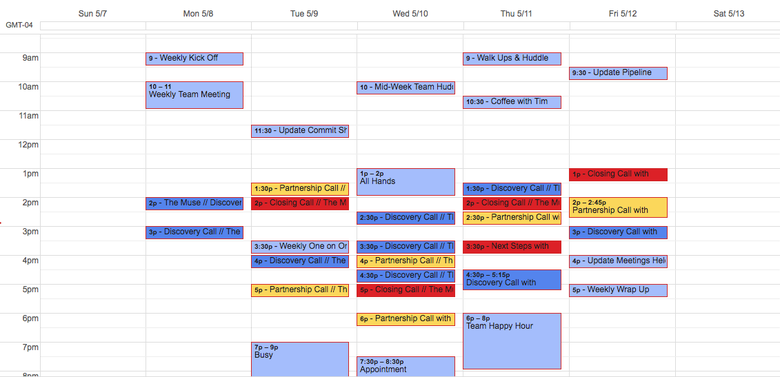
On paper, a lot of sales jobs sound interesting. And, you may even already have the skills to transfer into the sales field. A strong work ethic? Check. A willingness to learn? Definitely.
But most job descriptions reveal very little about the day to day of the role—and that’s a pretty important factor when deciding which role to apply to. It may hint at software you’ll be using, or relationships you’ll be building, but you’ll still be left wondering what exactly you’ll be spending your time on.
This is exactly why I decided to scout out a real, life account executive at The Muse to see what it’s really like to work in sales—a.k.a., what her schedule looks like, what kinds of meetings she attends, and even the challenges she faces on a regular basis.
Meet Monica Ball
Originally from Minnesota, Monica has been in sales for three years. When she first graduated college, she started her career as a headhunter at a recruitment agency—which for her was essentially the beginning of her sales career, except instead of connecting a company with a product, she connected companies with candidates.
But even before post-grad, she had experience working on commission in retail, and the concept of getting paid based on her hard work was extremely appealing.
What’s an Average Day Like?
“Since my clients are on the West Coast, my mornings are typically spent prepping for calls, following up with clients via email, and prospecting to try to find new business,” she says.
Then, after lunch (and when the time zones line up), she’s making calls, speaking to new prospects, and trying to close deals. Scattered throughout the day are team and department meetings, and at least one short coffee break or walk around the block.
So What Does That Actually Look Like?
Here’s a rough breakdown of Monica’s day:
It’s a lot, we know, but here’s the gist: It includes both internal meetings (weekly departmental kick-offs, team meetings, and one-on-ones with her boss) and external ones (a.k.a., sales calls), as well as administrative work. For example, Monica updates her pipeline—where prospective clients are in the cycle—on a weekly basis.
How Does a Sales Call Work?
As you can see on her calendar, the sales process is broken into three parts:
- The Discovery Call: The introduction call is when you meet the client and discuss their needs, challenges, and screen them to see if they’d be a good fit for your product or service
- The Presentation/Partnership Call: The second call is when you discuss how you would potentially work together and how you’d provide value to the client
- The Closing Call: The last call is when you answer questions and gauge if they’re interested in moving forward for a purchase
What Are the Upsides of Working in Sales?
Besides commission, you mean?
“I really enjoy the fact that I own my own business and the sky’s the limit when it comes to opportunity. While I have support from a manager and someone I report to, I enjoy the autonomy in my work and the fact that my work ethic has a substantial impact on my success,” Ball says.
And if prospecting new clients seems daunting to you, she actually says it’s one of the easier parts of the job: “While the challenging part of it is just doing it and grinding it out, it’s a relatively menial task.”
...And the Challenges?
In sales, rejection is something everyone faces and comes to expect on a regular basis—and it’s not always something you can combat: “Even when your prospect sees value in the product and wants to move forward, many times they can’t get approval due to budget cuts, competing priorities, and various external factors you have no control over,” she notes. Losing deals such as these can make hitting your monthly or quarterly revenue goal more difficult.
What Skills Matter?
Being able to face rejection and come out more resilient as a result are key to success in sales. Interpersonal skills are also extremely important: active listening, coachability, and accountability, to name a few. Finally, like any job, you should have an innate drive and natural curiosity for people, products, and the world of sales.
Like any job, sales isn’t for everyone (and not every sales job is like Monica’s). But for those itching for a career that lets them interact with people, form meaningful and beneficial relationships with other businesses, and really see the progress and success of their efforts, sales might be just the path.

